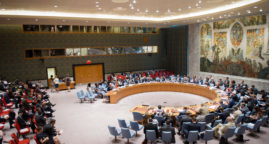UN : Action Plan for Preventing Violent Extremism
Differing Views Emerge over Details as Delegations Acknowledge Imperative of International Cooperation in Tackling Rising Phenomenon
The General Assembly decided today that it would devote more time to examining the Secretary-General’s proposed plan of action to prevent violent extremism, as diverging views emerged on some key details.
Adopting a procedural draft resolution, the 193-nation Assembly welcomed Secretary-General Ban Ki-moon’s initiative but decided to “give further consideration” to the plan, including in other relevant forums, such as the Global Counter-Terrorism Strategy review in June 2016.
Tabled in December 2015, the proposed action plan recommended that each Member State develop its own national action plan to prevent violent extremism, with a focus on seven priority areas: dialogue and conflict prevention; strengthening good governance; human rights and the rule of law; engaging communities; empowering youth; gender equality and empowering women; education, skill development and employment facilitation; and strategic communications, including through the Internet and social media.
The proposed action plan received mix reviews during today’s debate. While some delegates agreed on the need to prevent violent extremism, others felt the proposal lacked a deeper and broader look into the root causes of radicalization.
In his opening remarks, General Assembly President Mogens Lykketoft (Denmark) said violent extremism was on the rise across the world, and the pain, fear and destruction it caused presented real and difficult challenges for all Member States. In that regard, confronting and preventing the phenomenon was fundamental to protecting all societies and people, he emphasized.
Norway’s representative said poverty was not the sole cause of extremism, pointing out that marginalization was also a contributing factor. The international community must address both “push” and “pull” factors, he added, emphasizing the need for a strong, well-resourced United Nations that was “fit for purpose”.
The United Kingdom’s representative welcomed today’s Assembly decision, stressing that all Member States had spoken in one voice, united against violent extremism and in solidarity with its victims. The plan was pragmatic and comprehensive and contained a recommendation to develop robust national action plans.
Austria’s representative also said the proposed plan was balanced and comprehensive. Implementing it would be the responsibility of each Member State, and Austria had already put such a plan in place, he said, urging other Governments to follow suit.
Saudi Arabia’s representative, speaking for the Organization of Islamic Cooperation (OIC), emphasized the need to address the root causes of violent extremism, including the historical injustices of colonialism, foreign occupation and denial of self-determination, stressing that it could not be defeated by military actions alone.
For India, the proposed plan was full of prescriptions for Member States, but short on what the United Nations would do to help Governments, that country’s representative noted, adding that it offered no single contact point for assisting them. Addressing the phenomenon was the primary responsibility of Member States, but it was a global contagion, requiring international cooperation to address it.
The representative of Bangladesh noted that the proposed plan of action touched on issues of foreign occupation, protracted conflict and systematic human rights abuses, but shied away from naming particular examples. It focused instead on local drivers of extremism while demonstrating little understanding of major international trends, including illicit financial flows.
Turing to the human rights front, Pakistan’s representative expressed regret that negative stereotyping, stigmatization, discrimination and intolerance had been ignored or given little consideration. Additionally, xenophobia, in particular Islamophobia, was rising in the West and had gone unchecked so far.
In other business today, the Assembly adopted a draft resolution by which it took note of the Economic and Social Council’s endorsement of the recommendation by the Committee for Development Policy that Angola be graduated from the least developed country category. It also decided to give Angola an additional two years, on an exceptional basis, before the start of the three-year preparatory period leading to graduation.
Angola’s representative expressed his Government’s commitment to the graduation process, but stressed that it should not disrupt the growth of the country’s commodity-dependent economy, which was currently undergoing a difficult period.
Read the full article on the UN website
Related Articles
Dialogue and confidence vital to prevent, resolve conflicts, says UN chief
In cases involving weapons of mass destruction, “verifiable disarmament and non-proliferation” efforts are critical, stressed the UN chief
Syria: to end a never-ending war
June 2017. The present paper aims to propose a strategy for the conflict’s resolution, and for leading Syria towards a stable political recovery.
“Syria will inevitably erupt in both entities”
09/02/2016. For the international reporter of Le Figaro, the unity of Syria no longer exists and neither side can prevail over the other.






